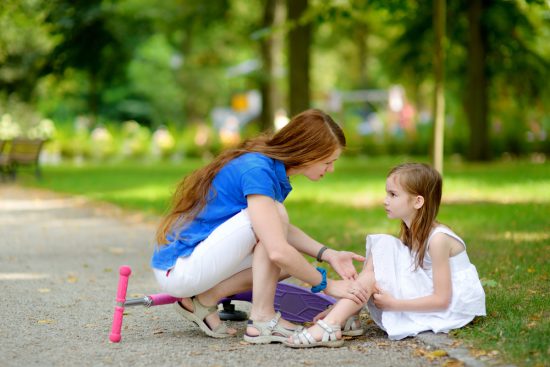The well-prepared babysitter knows what to do in an emergency, for instance if a child is sick or injured. That’s because you’ve hopefully posted emergency numbers on the refrigerator or other easy-to-see space. But other than calling the right people for help, does your babysitter really know what to do in the meantime, in the immediate aftermath of the crisis? Many babysitters, it seems, do not. They simply lack the knowledge.
How many babysitters, for example, know how to handle a choking episode? Do babysitters come to the job knowing what to do about a child who stops breathing? Is your babysitter aware that it’s bad to move someone who has been in an accident, in case there is injury to the spinal cord?
Oh, and by the way, does your babysitter know that the baby should only be placed on her back to sleep?
Most parents care that the babysitter is mature and responsible. They take the time to go over important information with the babysitter before they leave, and they leave a number where they can be reached. But not too many parents think about checking what the babysitter knows about emergency care. And while a parent may be careful about the baby’s sleep position, the same parent may not think to tell the babysitter to be careful, too.
Babysitters Should Be Educated About SIDS
A University of Virginia study from 2018, found that babies who died in their sleep while being watched by someone other than their parents, had often been placed in unsafe sleeping positions or in unsafe places. An unsafe place would be, for instance, the sofa. In light of these findings, lead author of the study, Rachel Moon, MD, urged parents to educate babysitters and others on the important of safe sleep practices and about the risks for Sudden Infant Death Syndrome (SIDS). SIDS is the leading cause of death among babies from 1 month to 1 year. “If someone else–a babysitter, relative, or friend–is taking care of your baby, please make sure that they know to place your baby on the back in a crib and without any bedding,” said Moon.
Adult Babysitters No Better In Emergencies
A 2017 national poll on children’s health by researchers at the University of Michigan, meanwhile, found that fewer than half of all parents of children up to the age of five had posted important emergency contact information for an adult babysitter, such as a relative or a friend. We’re talking parents’ work or cell phone numbers (48 percent), the number of the child’s doctor (47 percent), or contact information for a different family member or friend (42 percent). Worse yet, the farther parents lived from an emergency room, the less likely they were to post that all-important emergency contact information. Perhaps these parents assumed that these sitters being adults, would know what to do in an emergency and whom to call.
“Parents often need extra babysitting help around the holidays when childcare facilities are closed and regular babysitters are less available,” said the co-director of this poll, Sarah Clark.
“Family members and friends may be a natural choice to help watch children but parents should make sure they are preparing babysitters for emergencies, especially those who don’t have young children themselves. Sitters should be able to easily find key contact information and be comfortable handling different types of emergencies. Parents shouldn’t assume sitters have all of the information they need. They should go over basic information whether they will be gone all day or just a couple of hours.”
In fact, adult babysitters, especially those without children, turn out to have very little knowledge of how to care for a child in the case of an emergency. When asked what to do if a child sustains a minor burn, 13 percent of those polled said they’d take the child straight to the emergency room. In the case of a child who may have swallowed prescription medication, 49 percent said they’d call poison control, while 38 percent said they’d straight away take the child to the ER. If a child was found to be choking, most of the childless adult babysitters would try to remove the object causing the child to choke, but another 8 percent would immediately bring the child to the ER.
Pre-Teen Babysitters: Age Matters
It’s not just the older, childless babysitter who doesn’t know the ropes. The same could be said of very young babysitters. At a 2010 American Academy of Pediatrics (AAP) conference, research was presented that suggests that while most 11-to-13-year-old babysitters know whom to contact in an emergency, a lot of younger babysitters did not.
The good news is that 98 percent of the 11- to 13-year-old babysitters knew whom to call if the child was sick or injured, or there was an intruder (98 percent). Most knew what to do if a child were poisoned (85 percent). But 40 percent of younger babysitters said they’d left the kids unattended while babysitting, and another 20 percent opened the door to a stranger. Which is pretty scary.
The upshot? You do not want to call in that 9-year-old neighbor child, or have your 10-year-old daughter watch your 2-year-old son. Maybe their judgment in these matters isn’t quite developed enough to handle these situations. Who knows? Just don’t ask them to babysit. It’s not worth the risk.
It may feel a bit awkward to grill your babysitter on what to do in an emergency, especially if the babysitter is an adult. It might seem kind of crazy to go over all the possible emergency scenarios. But as it turns out, you’re not being overcautious to make sure they know what to do. You’re being proactive. And it may just save your child’s life.
Found what you just read useful? Why not consider sending a donation to our Kars4Kids youth and educational programs. Or help us just by sharing!
